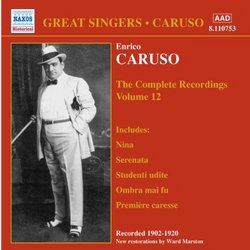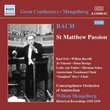| All Artists: Vincenzo Ciampi, Vincenzo De Crescenzo, Ernesto de Curtis, Carlos Gomes, C.A. Bracco, Salvatore Fucito, Antonio Secchi, George Frederick Handel, Guillermo Posadas, Fromental Halevy, Joseph Giuseppe Gioe, Stefano Donaudy, Giacomo Meyerbeer, Jean-Baptiste Lully, James Carroll Bartlett, Gioachino Rossini, Enrico Caruso, Edwards, Alberto Franchetti, Josef A. Pasternack Title: Caruso: The Complete Recordings, Vol. 12 Members Wishing: 0 Total Copies: 0 Label: Naxos Release Date: 5/18/2004 Genres: Special Interest, Pop, Classical Styles: Vocal Pop, Opera & Classical Vocal, Historical Periods, Baroque (c.1600-1750), Modern, 20th, & 21st Century Number of Discs: 1 SwapaCD Credits: 1 UPC: 636943175323 |
Search - Vincenzo Ciampi, Vincenzo De Crescenzo, Ernesto de Curtis :: Caruso: The Complete Recordings, Vol. 12
 | Vincenzo Ciampi, Vincenzo De Crescenzo, Ernesto de Curtis Caruso: The Complete Recordings, Vol. 12 Genres: Special Interest, Pop, Classical
|
Larger Image |
CD DetailsSimilar CDs
|
CD ReviewsCaruso--All of the Legend in Great Sound Gregory B. Mowery | New York, NY USA | 08/03/2004 (5 out of 5 stars) "I've been scratching my head over Caruso re-issues over the past 30 years, and frankly didn't understand why the world needed another complete set of the great tenor's recordings. But Naxos hired the great Ward Marsden to re-master this set, which now comes to a triumphant conclusion with Volume 12. The price is astoundingly good in the bargain, with excellent liner notes on each issue. All the CDs are generously filled. Caruso's robust, but never out-sized singing is a revelation. The voice has range, color, depth, size, spin, and superbly conveys pathos, comedy, elegance, power, and intimacy. Beginning in 1904 up through 1920, we get sixteen years of great singing. The voice got darker, but it certainly never lost its ability to astonish and console. There simply is no decline of vocal powers throughout the set. Even singing "Vecchia zimarra," Colline's coat aria from Puccin's LA BOHEME, Caruso is a revelation. He sang this bass aria for a colleague in vocal distress one evening at the Metropolitan Opera. Nobody knew it until later. Caruso sings very convincingly in the bass range. This entire sets belongs in the collection of any serious vocal lover. He was a people's tenor, but one with a lot of class. He had the common touch, which means he appealed to everyone. More than 80 years later, Caruso's singing never ceases to amaze and thrill listeners. Gigli and Pavarotti both enjoyed bestselling recording careers and Pavarotti certainly has enjoyed as big a career in the modern era, but Caruso was still a bigger star in his time. Deservedly so, as these great records, both classical and popular, will attest." The final recording sessions. John Austin | Kangaroo Ground, Australia | 07/21/2004 (5 out of 5 stars) "Death intervened before the 47-year-old Enrico Caruso could continue to record beyond these sessions from 1919 and 1920. Six recording sessions yielded 17 items. They are all included here, together with an item from Caruso's very first recording session transferred from a better copy than was used in Volume 1 of the Naxos Caruso series.
I read in the accompanying notes that Caruso's vocal powers were in serious decline by the time these last recordings were made and that the Victor recording processes were less favorable to his voice during his last years. To my ears, neither of these assessments seems right. Listen, for example to Tracks 10 and 11, from September 1919. Never has a voice leapt out of loudspeakers with such power! True, it is a darker voice than it once was, but the effulgence of the voice and the confidence of the presentation is astounding, and the recording process seems to capture it all vividly. A couple of curiosities are included in this 69 minute CD: a brass band rendition of a march written by Caruso, and a novelty vocal, mercifully not too long, called 'My Cousin Caruso' presented by Billy Murray. " |

 Track Listings (20) - Disc #1
Track Listings (20) - Disc #1


